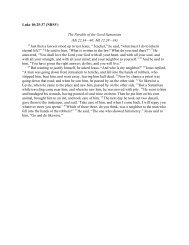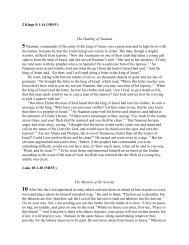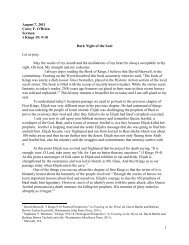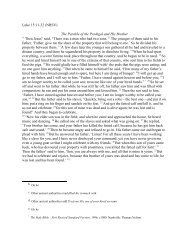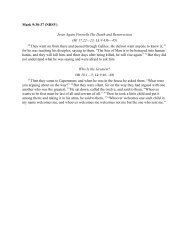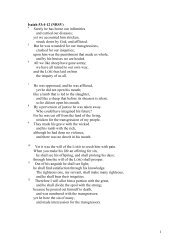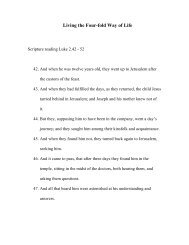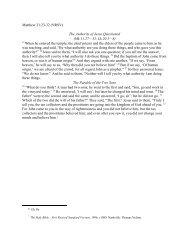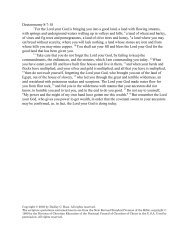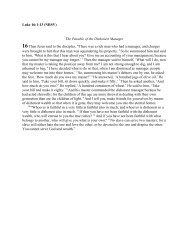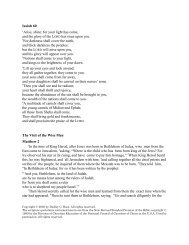Matthew 4:1-11 (NRSV) The Temptation of Jesus (Mk 1.12â13; Lk ...
Matthew 4:1-11 (NRSV) The Temptation of Jesus (Mk 1.12â13; Lk ...
Matthew 4:1-11 (NRSV) The Temptation of Jesus (Mk 1.12â13; Lk ...
You also want an ePaper? Increase the reach of your titles
YUMPU automatically turns print PDFs into web optimized ePapers that Google loves.
convince us that one or the other needs some adjustment. On the other hand, I believe that theones I have mentioned would find remarkable consensus.Now there is one more significant hurdle. Without getting into too much detail, or boringyou to death, interpreting individual passages from the Bible is complicated by a variety <strong>of</strong>factors. We may be guessing at the meaning <strong>of</strong> some <strong>of</strong> the ancient customs that are in thestories. We have to translate from other languages, and translation always involves choices, andwhat the translator chooses is a matter <strong>of</strong> interpretation. <strong>The</strong> meaning the text had in its time isnot always so readily transported into our time. For example, how many Christians findcircumcision to be an important religious issue? Not many, I suppose, but for Paul and hischurches it was <strong>of</strong> huge importance. So, even when we have some fundamental perspectives inhand, each passage <strong>of</strong> the Bible continues to present complications. I suppose all <strong>of</strong> this is to saythat the Bible requires careful and disciplined study.In any case let’s take a look at our championship pro<strong>of</strong>-texting bout between <strong>Jesus</strong> andthe devil and see if careful interpretation and the use <strong>of</strong> our basic principles help us understandwhat’s going on.<strong>The</strong> temptation passage occurs right after <strong>Jesus</strong>’ baptism, before he begins his ministry.We can expect it to illuminate some <strong>of</strong> his basic themes, then. If we look at it as a whole, itwould appear that the devil is <strong>of</strong>fering <strong>Jesus</strong> the power and wealth <strong>of</strong> the world. <strong>Temptation</strong> isprobably a bad translation <strong>of</strong> what’s going on here. A better one is testing; the devil is testing<strong>Jesus</strong>. But in a sense, it’s even more basic than that. <strong>The</strong> devil may well have been <strong>of</strong>fering<strong>Jesus</strong> the things he assumes anyone would want–snapping your fingers when you are hungry andbread appears from the stones, the avoidance <strong>of</strong> earthly death, and power and wealth. But <strong>Jesus</strong>claims the basic ground <strong>of</strong> his ministry. Ingesting only the bread you eat and forgetting aboutthe nourishing word that comes from God will leave you starving. Requiring God to proveimmortality in a physical way turns a matter <strong>of</strong> faith into a science experiment, and disregardsthe greater promises <strong>of</strong> God. And the pursuit <strong>of</strong> power and wealth <strong>of</strong> the world, rather than thepower and wealth <strong>of</strong> God, will leave you at the end <strong>of</strong> the day poor, indeed. <strong>The</strong>se representthemes <strong>of</strong> <strong>Jesus</strong>’ ministry. He is putting us on notice that he will come back to them time andagain.When we look at the title bout between the devil and <strong>Jesus</strong> in these terms, we realize that<strong>Jesus</strong> is not denigrating bread, but is simply saying that physical bread without spiritual breadwill not satisfy real hunger. <strong>Jesus</strong> is quoting scripture in service <strong>of</strong> and consistently with thebasic perspectives he finds in scripture. <strong>The</strong> most convincing answer, then, to how one tells ifthe person quoting scripture is more like <strong>Jesus</strong> or more like the devil, the most convincinganswer is found in how consistent or inconsistent the pro<strong>of</strong>-texter is with the basic teachings <strong>of</strong><strong>Jesus</strong> and the Bible.In our passage this morning the devil was the devil because he represented the values thatmuch <strong>of</strong> the world espouses, values that <strong>Jesus</strong> threw a knockout punch against. In short, if youhear someone representing worldly gain and power as the word <strong>of</strong> God, you can bet it’s the devilwho is quoting you scripture. As the Gospel says elsewhere, “Let those who have ears hear.”Amen.Copyright © 2005 by Dudley C. Rose. All rights reserved.4



